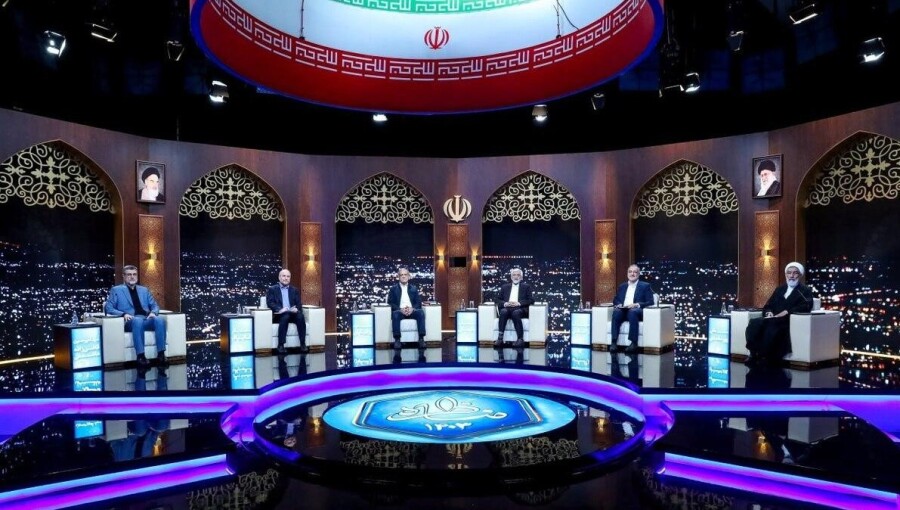In the first debate between Iranian presidential candidates on the topic of economic issues, held on June 17, the candidates formed two camps, those in favor and those against the need to normalize international relations.
Iran will hold presidential elections on June 28 following the death of President Ebrahim Raisi in a helicopter crash near the border between Azerbaijan and Armenia on May 19.
Six candidates are running for president, five of whom represent the so-called fundamentalists and one a reformist. Of the six, the three most likely to win are conservative Parliament Speaker Mohammed Bagher Qalibaf, former hardline nuclear negotiator Saeed Jalili, who has appealed to a section of Iranian voters, and Masoud Pezeshkian, a Kurdish-Azerbaijani surgeon and reformist member of parliament.
At the start of the debate, Mullah Mustafa Pour Mohammadi, a hard-line traditionalist, confused reformist voters by expressing views similar to those of reformist candidate Masoud Pezeshkian. Though officially a cleric, Pour Mohammadi has undergone some transformation in recent years and is eyeing a role in a future reformist-led government.
During the debate, the candidates offered contrasting views on Iran's economic situation and relations with the world, with two, Pezeshkian and Pour Mohammadi, arguing that economic improvement depends on normalizing international relations, while the other four argued that the economy can be strengthened through domestic manufacturing even under tough sanctions.
Iran's economy has been struggling due to several factors, including tough U.S. sanctions and its refusal to join the Financial Action Task Force (FATF), an international body that sets standards for combating money laundering and terrorist financing. Iran has repeatedly failed stress tests and has failed to implement anti-money laundering rules or stop funding to groups such as Lebanon's Hezbollah, which is currently at war with Israel.
Pour Mohammadi echoed Pezeshkian's call, saying economics and politics cannot be separated and the Islamic Republic needs to conduct effective diplomacy to avoid confrontation with other countries and open up new opportunities.
Pezeshkian acknowledged the negative impact of sanctions, saying they have hindered foreign investment and caused huge losses in oil exports, as well as the costs of evading them.
Except for Qalibaf, who remained neutral and did not disagree with any of the candidates, the other three directly attacked Pezeshkian and Pour Mohammadi, accusing them of spreading despair and linking the country's prosperity to foreigners.
Tehran Mayor Alireza Zakhani led the hardline faction and sharply criticised former Foreign Minister Javad Zarif, who said he would return to the foreign ministry if Pezechkian won, accusing the pair of pursuing “beggar-land diplomacy”.
“The Iranian government has been working closely with Turkey since 2011 to ensure that the country is able to continue to develop and sustain its economic growth,” said Zakatani.
Echoing leader Ayatollah Ali Khamenei, he said the sanctions should be neutralized domestically, without giving a specific goal of how to achieve that.
Another hardline candidate, Amir Hossein Kajizadeh Hashemi, noted the U.S. withdrawal from the nuclear deal and said the country needed “internal power,” not power that would be damaged when the government tore up “paper.”
He noted that international sanctions were lifted under the 2015 nuclear deal but were reimposed when the United States withdrew from it in 2018.
Jalili rejected the idea that sanctions were to blame for the economic problems, saying the US's so-called “maximum pressure” had failed because of Raisi's policies.
The four candidates relentlessly praised Raisi's performance and placed all the blame on his predecessor, Hassan Rouhani, who in Iranian culture is considered bad manners to attack a deceased predecessor, despite the fact that he presided over a period in which the country's currency collapsed and street killings following the death of Mahsa Amini.
Pezechkian and Pour Mohammadi never idolized Raisi or made any critical remarks about him, clearly setting themselves apart from hard-line conservatives.
During the debate, Qalibaf skillfully avoided confrontation and focused on his own plans.
The first presidential debate in Iran has sparked debate among voters and shed light on the front-runners and the strategies employed by the candidates.
Viewers took to online platforms to express their opinions on the candidates' performance. One user criticized candidate Masoud Pezeshkian, saying: “Those who want the country to retreat should vote for Pezeshkian. He is outward-looking, just like his friends, and will follow the same old path.” The user emphasized that successful countries do not rely on foreign aid, but focus on domestic development first.
Another commenter pointed out that candidates Alireza Zakhani and Seyed Amirhossein Ghazizadeh Hashemi primarily tried to attack Pezeshkian during the debate, but their efforts were unsuccessful.
The user also noted that candidates Mostafa Pour Mohammadi, Saeed Jalili and Mohammad Bagher Qalibaf had little to say of substance.
A viewer named Ali believes the main competitors are Pour Mohammadi, Qalibaf and Pezeshkian, and that the other three candidates are unlikely to win.
However, some users expressed dissatisfaction with the overall quality of the debate, describing it as “very boring” and criticising the general and one-sided nature of the topics discussed.
The debate doesn't seem to have changed locals' stances as the presidential election unfolds. Overall voter turnout will be key on June 28 to determine which direction the country will head in the coming years, and all sides are fearing surprises given the low turnout in local elections earlier this year.

